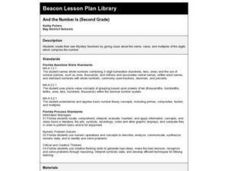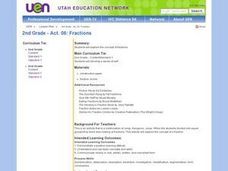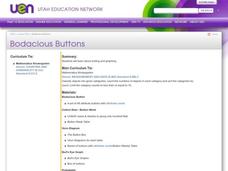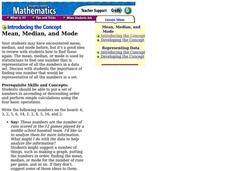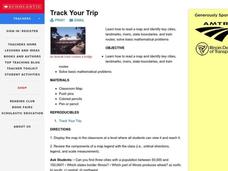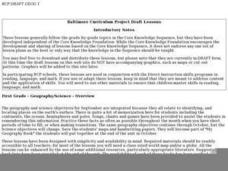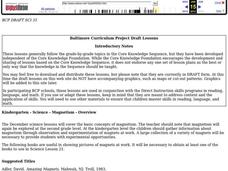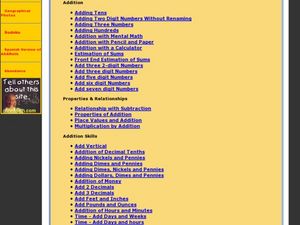Curated OER
Figure It Out - Polygons
Sixth graders explore different polygons. In this polygon instructional activity, 6th graders examine a rhombus, quadrilateral, parallelogram, and rectangles. Students compare and contrast polygons and research shapes on the Internet.
Curated OER
Telling Time
Students identify numerals on a clock and put them in correct order. They identify the hour and minute hands on a clock. Students practice time skills by telling time by the hour using a standard clock.
Curated OER
How Many Ways Can You Represent a Number?
Students participate in monthly scaffolded lessons that focus on working with whole numbers from 1 to 10. They work with tiles on exploration mats, number tile mats, and a number representation book. Each month they complete activities...
Curated OER
Fractions
Students explore the concept of fractions after reading Jump, Kangaroo, Jump. They are given fraction circles and are given the opportunity to explore and investigate them.
Curated OER
Probability
Third graders conduct experiment, collect data, predict, record, and discuss outcomes, and analyze data for probability.
Curated OER
And the Number Is (Second Grade)
Second graders create Mystery Numbers. They give the class clues about the name, value, and multiples of the digits which make up the number.
Curated OER
Teaching Values of Decimals
Students participate in a number of activities in order to reinforce the study of the place value for decimals. They name place values for ones to thousandths.
Curated OER
The Android Factory
Pupils explore the idea that primitive virtual 3D objects can be reshaped to infinitely original combinations using additive and subtractive methods. They create 3-D objects with a computer which necessitates a cooperation of right-brain...
Curated OER
Bodacious Buttons
First graders graph a data set. Given a set of buttons, 1st graders sort them into categories using specific attributes. They graph the number of buttons in their set based on their attributes using a variety of graphs. Students share...
Curated OER
Native American Foods
Students explore Native American foods. In this middle school mathematics lesson, students research the types of foods Native Americans across the country typically ate. Students summarize a recipe in their own worlds.
Curated OER
Money
Pupils speak and listen to different prices of items and complete a worksheet. In this prices lesson plan, students circle the correct prices on a sheet they are given based on the ones their teacher calls out.
Curated OER
Fair-division
In this division worksheet, students complete word problems with division about pizza slices, jelly servings, percentages of cards, and more. Students complete 14 problems.
Curated OER
Finding Addition Patterns
Students practice finding the sums of two-one digit numbers. In this addition lesson plan, students also record facts onto an addition chart.
Curated OER
Mean, Median, and Mode
Students calculate the mean, median, and mode in a set of numbers. In this data analysis lesson, students put a set of numbers in ascending order and perform calculations to find the mean, median, and mode.
Curated OER
Let's Play Scrabble!
What do Alfred Mosher Butts, James Brunot, and Jack Straus have in common? They were all instrumental in the development of Scrabble. Class members will discover these facts and many more as they conduct a WebQuest to gather, organize,...
Curated OER
Track Your Trip
Fourth graders are shown how to read a map and identify key cities, landmarks, rivers, state boundaries, and train routes. They solve basic mathematical problems. Students reivew the componets of a map legend. They are asked to find...
Curated OER
Whistle Mixer
Learners engage in an easy way to practice addition and subtraction skills while moving in different ways.
Curated OER
Geography: Continents
First graders identify basic geographical facts about the world they live in and distinguish between land and water on a globe. They research the continents and information associated with each one focusing on building their map skills.
Curated OER
MAGNETISM
Students infer that there are forces we cannot see that act upon objects, experiment with magnets to show a push and/or pull force, and participate in a magnet game.
Curated OER
A collection of Addition Lessons
Students solve problems by adding. In this collection of addition lessons, students answer a variety of word problems and utilize addition skills. Links provide access to definitions and sample problems.
Curated OER
Our Daily Five
Students explore the food pyramid through a class discussion, hands-on experience with food items, and a floor game that helps them to identify the food group involved. Lesson extensions include the use of play money, art, and dance.
Curated OER
Falcon KWL Chart
Students create KWL charts about falcons. They write what they know about falcons and what they want to know about them. They read for information on falcons and complete the last column of their chart with the information they...
Curated OER
What Do I Really Have to Gain?
Second graders further develop simple addition facts and their ability to record the facts.







